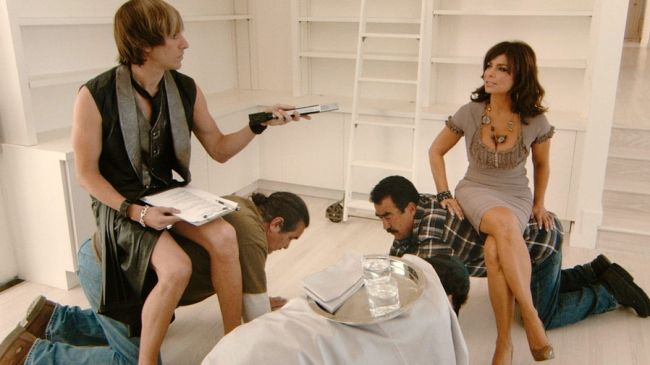

In debate prep sessions, when Buttigieg rehearses his response to a police shooting of a Black man in South Bend, his senior adviser Lis Smith says, “He’s comin’ across like the f-ing tin man up there.” When he talks about his experiences as a gay man, she tells him it’s like he is “reading a f-ing shopping list,” she says. I think he’s learned to allow personal narrative to have more impact,” he tells Moss. “I would say, ‘What’s going on in that head of yours?’ And he’s grown a lot, being able to verbalize. In a seated interview for the film, Chasten recalls the early days of their relationship. Bernie Sanders is on TV, speaking on stage surrounded by his wife and family, when Chasten says from the couch, “You’re gonna be the only candidate that didn’t have your spouse standing next to you.” Buttigieg doesn’t really respond. In one subtly heartbreaking scene, Chasten is in their Des Moines hotel room, watching live coverage of the Iowa caucus returns. The sharpest moments of tension come when Chasten and campaign aides push Buttigieg to open up, including about his identity as a gay man. Always, it was against the urging of his own husband and campaign team. Always, he erred on the side of less rather than more. The real drama that unfolds on screen is not about the ups and downs of a campaign, or even Buttigieg’s political prospects, though he states plainly in the film’s final scene that he could run again: “Time is on my side.” What you see instead is more basic: a story about personal identity in politics - a man, then 37, a presidential candidate, a breakout star, now the most prominent member of President Biden’s cabinet, who at every turn was unsure of how, or exactly how much, to share himself with the world. It’s the feeling of an inaccessible interior - of watching a person who is still becoming comfortable with himself and doing so on the biggest stage imaginable. “There were moments where I threw up my hands in frustration and despair.”Īnd that’s the underside of Moss’s premise, the dilemma in his film on constant display: It’s not exactly that Buttigieg is “bull-ing” us, as Chasten says in the first scene, or even that what you see is not, in fact, what you get.

“I was very stymied by that,” Moss told me ahead of the film’s release this Friday. At points, Moss says, he felt confounded by his own subject, turning to Chasten to bring Buttigieg emotionally within arm’s length. You can sense there is constant activity happening, not on screen, but somewhere inside his head, far off and out of reach.

He does not, by his own admission, have the “gregarious charisma” of Bill Clinton. For 96 minutes, in scenes ranging from public events to the privacy of his own home, there is Pete, acting like Pete: reserved and calm, a sweet husband, a nerd (“Did someone say pivot table!?” he asks in one scene, exuberant at the chance to help format an Excel spreadsheet), an introvert. The proposition he interrogates in the film, built on cinéma vérité-style footage from inside the 2020 campaign, is that when it comes to Buttigieg, what you see is what you get. But peeling back the layers, Moss found, could feel like an impossibly frustrating task. Now a feature film by Moss, director of the 2020 film “Boys State,” aims to fill the lingering curiosity gap about a candidate who has shaped his own unexpected political identity, first in South Bend, Ind., and now in Washington. The beat-like coverage of his arrival in Washington this year - of his new kids, his aides, his role in the Biden administration, his presumed future presidential run(s) - is not typically commensurate with the job title of transportation secretary.

Roads and bridges have apparently never been so interesting. Two and a half years after his run for president, Buttigieg has managed to hold America’s attention and fascination. Before he leaves, Chasten turns to his husband. “Can he answer that?”īuttigieg walks in the room. “Do you think he’s ready to answer that question?” Moss asks. “You spent so much of your life hiding who you really were - did you feel like you were able to be your true self on the campaign trail?” Buttigieg didn’t come out of the closet until 2015, when he was 33, already mayor. “He did everything to climb every ladder without being his authentic self,” he says. Chasten, holding the couple’s one-eyed puggle upright in his lap, tells Moss to ask Buttigieg about his identity.


 0 kommentar(er)
0 kommentar(er)
